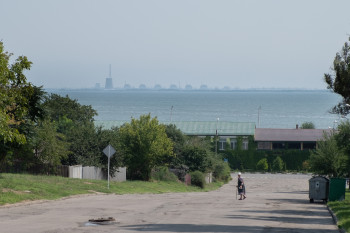Russian shelling disconnects Zaporizhzhia nuclear plant from Ukrainian grid, operator says

A nearby fire sparked by Russian shelling disconnected the Zaporizhzhia Nuclear Power Plant from the Ukrainian grid for the first time in its history, Ukraine’s state nuclear company Energoatom reported on Aug. 25.
The two operating reactors at the plant suffered a "complete disconnection” from the grid, according to Energoatom. The International Atomic Energy Agency (IAEA) said Ukraine had informed the organization that the reactors’ emergency protection systems were triggered.
While all safety systems remained operational, all six reactors at the plant were still disconnected from the electricity grid even after the temporarily severed power line had gone back up, the report says.
World leaders have been gravely concerned about Europe’s largest nuclear power plant in the Russian-occupied city of Enerhodar, Zaporizhzhia Oblast, since it was seized by Russian forces in early March. The situation was deteriorating, as the repeated shelling near the site raised fears of a nuclear catastrophe.
The West and Ukraine have accused Russia of using the plant as a shield and a tool for blackmail amid counteroffensive threats in the south.
Ukraine had earlier reported that a fire spreading in the ash pits near the Zaporizhzhia plant had cut off the last remaining power line that linked the reactors to the grid. The three other power lines that used to transfer electricity to the grid were previously damaged due to Russian shelling, according to Energoatom.
As a result of Russian activity near the plant, Ukraine told IAEA that it lost connection to the power line at least twice on Aug. 25.
“Almost every day there is a new incident at or near the Zaporizhzhya Nuclear Power Plant,” the IAEA Director General Rafael Mariano Grossi said, underscoring the urgent need for an IAEA expert mission to be allowed access to the site.
President Volodymyr Zelensky accused Russia of putting Ukraine and other European countries on the verge of a radiation catastrophe in his evening address later in the day. He reassured the nation that the government is doing everything to prevent an emergency scenario.
Energoatom had warned on Aug. 19 that Russia was planning to disconnect the plant from the Ukrainian grid in what was suspected to be a potentially risky effort to divert it to the Russian one.
Energoatom chief Petro Kotin told the Guardian on Aug. 24 that the plant’s electricity connections were already in a critical situation and the plant could risk a catastrophic failure of its cooling system if Russia disconnects it from the Ukrainian grid.
“During this disconnection, the plant won’t be connected to any power supply and that is the reason for the danger,” Kotin said in the interview.
In an effort to prevent a disaster, Ukraine has called for a permanent presence of inspectors from the United Nations’ nuclear watchdog at the nuclear site until it regains full control of the plant.
Russian dictator Vladimir Putin has agreed to facilitate the visit to the Moscow-occupied plant, AFP reported on Aug. 20, citing the French presidency.
On. Aug. 23, Grossi said in a statement that its special team could realize the visit within days if talks to gain access succeed.
However, the IAEA has not been able to visit the plant yet.
Zaporizhzhia nuclear reactors began operating between 1984 and 1995 and produced a fifth of Ukraine’s electricity in pre-war days.











